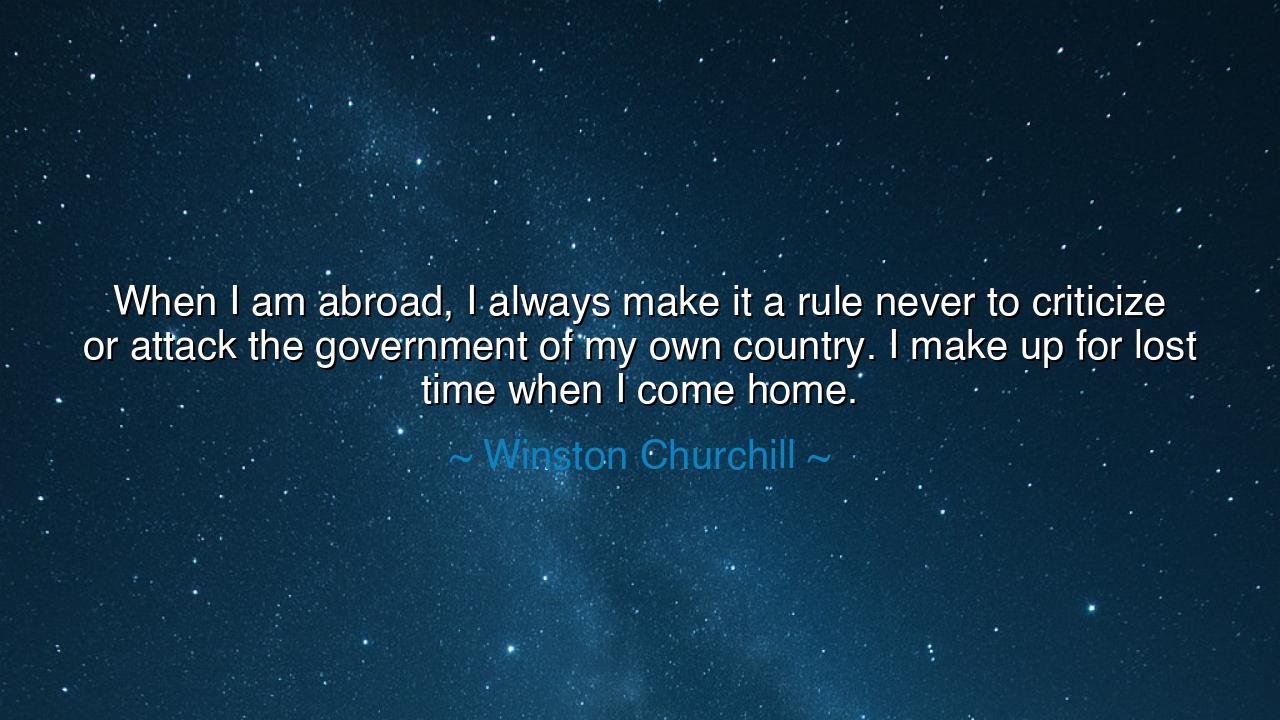
When I am abroad, I always make it a rule never to criticize or
When I am abroad, I always make it a rule never to criticize or attack the government of my own country. I make up for lost time when I come home.






"When I am abroad, I always make it a rule never to criticize or attack the government of my own country. I make up for lost time when I come home." Thus spoke Winston Churchill, the lion of Britain, whose words carried the weight of centuries and the thunder of war. In this sentence, lighthearted in tone yet profound in spirit, Churchill revealed a truth that every generation must remember: that loyalty and criticism are not enemies, but companions in the service of one’s nation. The wise man defends his homeland before the world, yet speaks his conscience within it. He knows that to preserve a nation’s dignity is a duty before strangers, and to refine its flaws is a duty before God.
Churchill’s words were born from the fire of experience. As a soldier, journalist, statesman, and prime minister, he had seen his country in both triumph and despair. He had fought in distant lands beneath the Empire’s flag, walked through the ruins of the Blitz, and guided Britain through the darkness of the Second World War. He knew better than most that a nation’s unity is its armor, and that to expose its divisions before foreign eyes is to weaken its strength. Yet he also knew that no government, however noble, is free from error — and that true patriotism demands not blind obedience, but honest correction. Thus, with wit that concealed wisdom, he declared his rule: defend at the borders, debate at home.
The meaning of Churchill’s quote is layered with both humility and strength. He reminds us that loyalty does not mean silence, nor does criticism mean betrayal. When abroad, he stood as a representative of his people — not merely of their government, but of their spirit, their resilience, and their pride. To speak ill of his nation before the world would have been to feed its enemies and wound its allies. Yet at home, where truth is the lifeblood of freedom, he spoke boldly and often, challenging leaders, policies, and complacency alike. For in his heart, Churchill believed that a government must be loved enough to be improved. To flatter authority abroad is diplomacy; to question it at home is democracy.
History itself provides the perfect mirror of this principle. Consider the ancient Athenians, whose assembly was a place of fierce debate and open criticism. They quarreled not because they hated Athens, but because they loved it too fiercely to let it decay in silence. Their orators — men like Pericles and Demosthenes — could praise the city before the world and yet lash its leaders in the agora. It was this paradox — loyalty through dissent — that made Athens great. And though the Athenian experiment perished in time, its lesson survived: that a free nation is not one without disagreement, but one strong enough to bear it. Churchill, the heir of that tradition, carried its flame into the modern age.
In his own life, Churchill lived by this creed with fiery passion. Though he is remembered as the great wartime leader who stood unbroken against tyranny, he was also, before that time, one of the fiercest critics of his government. He warned of Hitler’s rise when others mocked his alarm. He spoke against appeasement when others sought comfort in illusion. His criticism was not rebellion but foresight — the cry of a patriot who saw danger where others saw peace. And yet, when war finally came, he spoke as one with the nation, silencing division for the sake of survival. He understood that there is a time to argue and a time to unite; a time to speak against, and a time to speak for.
The lesson in Churchill’s jest is therefore timeless: that love of country requires both restraint and courage. Speak no ill of your homeland before those who wish it harm, for that is to wound your own family before strangers. But within your own walls, speak boldly and honestly, for silence in the face of folly is no virtue. The true patriot is not the one who flatters rulers, but the one who reminds them of their duty. In this balance lies the health of every republic and the strength of every free people.
And so, let the wisdom of Winston Churchill echo across the generations: "Never criticize your country before the world — but make up for lost time when you return home." His humor hides a principle as eternal as liberty itself — that patriotism is not servitude, but stewardship. Defend your nation from insult without, but cleanse it from error within. Be proud of your people, yet honest with your leaders. And remember always that the love which dares to correct is the love that endures. For a nation that can laugh at its flaws, learn from its mistakes, and still stand united before the world — that nation shall never perish.






AAdministratorAdministrator
Welcome, honored guests. Please leave a comment, we will respond soon